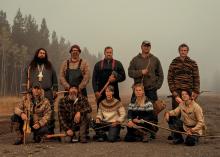I love the outdoors, but I’ll admit I’m far from being able to call myself a legitimate outdoorsman. I romanticize the idea of living out in the bush, being off the grid, being self-sustaining, focusing on survival. But I know it’s not as lovely as I make it out to be in my imagination, nor do I have the skills needed, or maybe the will, to do it.
I recently read Gary Paulson’s Hatchet series of books. While by no means definitive resources on outdoor living, they follow a young boy’s survival adventures in northern Ontario. I also watched a couple of seasons of Alone, the History Channel reality show in which contestants compete to see who can survive the longest by themselves in the wild with only the 10 items they choose to bring with them.
Regardless of how reliable or realistic these depictions are, they both remind me that the wild is just that, wild. I’m reminded how inexperienced and uneducated I am in regard to actually living in the wild. It is magnificently and breathtakingly beautiful, terribly real and humblingly dangerous. I am both ill-equipped and intrigued. I might have learned to identify and forage a few simple things in the bush, but I certainly couldn’t survive off ramps, puff balls and trout lily.
In both The Hatchet and Alone the most fear-inducing aspect of living in the wild is the presence of predatory animals: wolf packs, cougars, mountain lions and bears. Human frailty becomes abundantly apparent when confronted with these magnificent beasts. When out in the wild, they are the top of the food chain and demand great respect and awe. Watching Alone, contestants live with a constant low-grade anxiety, aware of the danger of predators. Anxiety becomes terror for participants and viewers during encounters with the beasts.
Psalm 76 is written to celebrate God’s great power, declaring God’s fearsomeness. There is one line, translated by Robert Alter, that helped me better appreciate God’s awesomeness in light of my outdoorsy idealism. Refulgent you were, mightier than the mountains of prey says Psalm 76:4.
Alter’s commentary on this verse says, “This phrase is strange, powerful, and haunting, and it does not call for emendation, as many scholars have claimed. ‘The mountains of prey’ are the wild mountains where lions and other predatory beasts roam. God is seen here as even more awesome than that scary realm.”
When it comes to the wild, to these majestic and terrifying animals, I have a deep and distant respect, a fascination, a reverential appreciation of their power, and also a healthy fear of them, knowing that when confronted with them my life is in danger.
I’m not sure that I want to over-emphasize a parallel between my relationship with wild beasts and God, but I think there is something helpful there to hold on to.
We are quick to cling to the unconditional love, compassion, grace, forgiveness and kindness of God, but there is no shortage of scripture that promotes a healthy fear of God’s holy awesomeness. I do struggle to know how to understand the “fear the Lord” characteristics of God, but perhaps this “mightier than the mountains of prey” can help me understand how to hold a healthy fear of a powerful, beautiful, dangerous, untamed and majestic God.
Joshua Penfold lives in New Hamburg, Ontario and can be reached at penfoldjoshua@gmail.com.




Add new comment
Canadian Mennonite invites comments and encourages constructive discussion about our content. Actual full names (first and last) are required. Comments are moderated and may be edited. They will not appear online until approved and will be posted during business hours. Some comments may be reproduced in print.